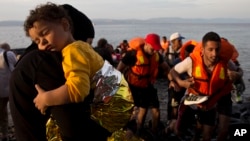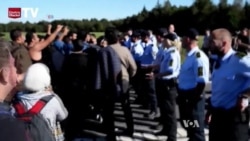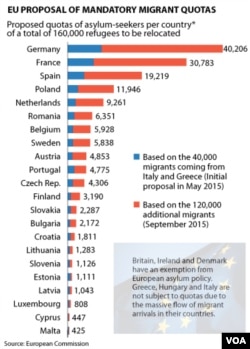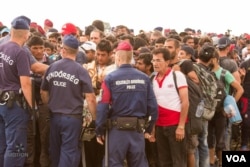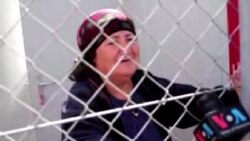The United States pledged Wednesday to accept more refugees fleeing from wars in Syria and elsewhere, even as Europe unveiled a mandatory country-by-country quota plan to resettle 160,000 migrants.
After meeting with lawmakers in Congress, U.S. Secretary of State John Kerry said, "We are looking hard at the number that we can specifically manage with respect to the crisis in Syria and Europe. That's being vetted fully right now."
Shortly after Kerry's meeting, U.S. Senator John McCain went to the Senate floor to urge stronger leadership from President Barack Obama on stemming violence in the Middle East and North Africa.
The Arizona Republican stood next to an enlarged, close-up photo of the body of 3-year-old Alan Kurdi, the Syrian boy who drowned along with his 5-year-old brother and mother when their small rubber boat capsized as it headed for Greece.
"This image has haunted the world," McCain said. "But what should haunt us even more than the horror unfolding before our eyes is the thought that the United States will continue to do nothing meaningful about it.''
White House press secretary Josh Earnest said Tuesday that the administration has been looking at a "range of approaches" for assisting U.S. allies with the thousands of people arriving from the Middle East, Africa and Asia.
Watch video report from VOA's Pam Dockins:
European Commission chief Jean-Claude Juncker called Wednesday for EU member states to resettle 160,000 refugees escaping from war in Syria and elsewhere — but was running into opposition from countries objecting to mandatory quotas.
"The Europe I want to live in is illustrated by those who are helping," Juncker told the European Parliament. "The Europe I don't want to live in is a Europe refusing those who are in need.
"We can build walls, we can build fences. But imagine for a second it were you, your child in your arms, the world you knew torn apart around you," he added. "There is no price you would not pay, there is no wall you would not climb, no sea you would not sail, no border you would not cross if it is war or the barbarism of the so-called Islamic State that you are fleeing."
But the Czech and Slovak governments held firm in their opposition to the country-by-country quotas Juncker said were needed to cope with Europe's worst migration crisis since World War II.
"I refused the quotas," Czech Prime Minister Bohuslav Sobotka said this week as details of the quota plan emerged, "because I don't consider quotas to be the real solution to the migration crisis."
Security concerns
Slovak Prime Minister Robert Fico expressed concern that terrorists might slip into Europe with the refugees massing on the continent's doorstep. Most of the migrants are looking to settle in more prosperous Western European countries, especially Germany and Sweden.
"When terrorists are grouping in Syria," Fico said, "how can we distinguish these people from the other migrants who are crossing the borders of the European Union without any controls?"
U.S. intelligence chief James Clapper echoed the same worries, saying, "I don't obviously put it past the likes of ISIL [the Islamic State insurgents] to infiltrate operatives among these refugees. So that is a huge concern of ours."
"We do have a pretty aggressive program for those coming to this country for screening their backgrounds," Clapper said. "I am not as uniformly confident about each European country that is going to be faced with welcoming or allowing refugees into their country."
Juncker said Europe could not leave Greece, Italy and Hungary alone to handle the vast influx of migrants.
"We Europeans should never forget why giving refuge and complying with fundamental right of asylum is so important," he said.
He urged EU interior ministers to endorse the resettlement plan next week.
Juncker also said he thought asylum seekers should be allowed to work while waiting for their applications to be processed. He said he expected all member states to pitch in to an emergency trust fund to address future such refugee crises.
Quota plan
The commission's plan calls for an expanded country-by-country migrant quota system throughout much of Europe, to accept thousands of asylum seekers from the Middle East over the next two years.
Under the plan, Germany, France and Spain would take in the most, followed by Poland, the Netherlands, Romania, Belgium and Sweden.
But the quota idea is controversial and adamantly opposed by Hungary and other Central European states.
The new distribution of asylum seekers would be based on a country's economic output, population, unemployment rate and the number of refugees each nation already had agreed to accept.
Chancellor Angela Merkel in Germany, where refugees have been welcomed with food, water and toys for children, has called Juncker's plan "a first important step."
In remarks Wednesday, she said if Europe failed on the refugee issue, then it would lose one of the founding impulses for a united Europe: universal human rights.
But she cautioned that migrants coming to Germany out of economic need, rather than fleeing war or political persecution, must be turned away.
Germany said it expected 800,000 refugees this year. Vice Chancellor Sigmar Gabriel said his country could accommodate a half-million refugees annually for several years.
Polls show many Europeans are opposed to the quota plan. Speaking before the parliament after Juncker, French far-right leader Marine Le Pen said giving migrants the right to work in France was like spitting in the face of the country’s 7 million jobless citizens.
Seeking peace
The U.N. said Secretary-General Ban Ki-moon called the heads of seven European governments in the last two days and stressed that the large majority of migrants were fleeing war and violence in their homelands and had a right to seek asylum.
One Syrian refugee, Mohammed Dahha, said he wanted to reach Sweden and was looking for a peaceful land.
"The people, they are moving from country to another country, from Asia to Europe, to get rest there, OK? To be under peace," he said. "They're looking for peace, because you cannot live without peace."
Lisa Bryant contributed to this report from Paris, and Jeff Seldin contributed from Washington.
WATCH: Video footage of migrants on Serbian border




